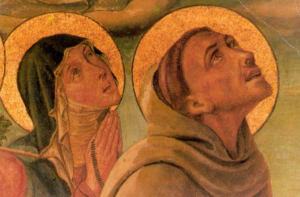 This is quite an impressive week on the Church’s calendar. It is marked by the Feasts of St. Teresa Benedicta of the Cross, St. Lawrence, St. Clare (today), St. Jane Frances de Chantal, Sts. Pontian and Hippolytus, and St. Maximilian Kolbe. A caution is in order: we can get easily sidetracked by thinking about these “greats of the faith” and forgetting about ourselves. Let’s remember that all who are baptized into Christ, all upon whom is given the grace and gift of love, mercy, and forgiveness, are called to be saints, called to holiness.
This is quite an impressive week on the Church’s calendar. It is marked by the Feasts of St. Teresa Benedicta of the Cross, St. Lawrence, St. Clare (today), St. Jane Frances de Chantal, Sts. Pontian and Hippolytus, and St. Maximilian Kolbe. A caution is in order: we can get easily sidetracked by thinking about these “greats of the faith” and forgetting about ourselves. Let’s remember that all who are baptized into Christ, all upon whom is given the grace and gift of love, mercy, and forgiveness, are called to be saints, called to holiness.
And yet, holiness is not something we do as much as it is something we are – it is who God has made us to be. And because of who and what we are, (hopefully) what we do agrees, confirms, and bears witness that we are, indeed, children of God. In a way, we can’t “try to be holy” – we can try to be who we are made to be, what we are made to become. The path to holiness, then, is a one way street to sincerity, simplicity, and the truth: the truth about who we are.
St. Clare was born in 1193 in Assisi to a noble family. Before her birth, her mother received a sign that her daughter would be a bright light of God in the world. As a child she was already very strongly drawn to the things of God, praying fervently, devoutly visiting the Blessed Sacrament, and showing a tender love toward the poor.
When she was 18, she heard St. Francis preaching in the town square and she knew at once that God wanted her to consecrate herself to Him. The next evening, Clare left her house at night, ran to meet St. Francis and his companions at the church they were staying in, and shared her desire to follow him in his way of life. He received her, gave her his tunic, cut off her golden locks, and sent her to a Benedictine convent, because she could not stay with the brothers.
When Clare was 22, St. Francis placed her in a small house beside the monastery and made her superior, a post she would serve for the next 42 years of her life, until her death. The “Poor Clares,” as they came to be known, lived an unusually austere life for women of the time, walking barefoot around the town begging for alms, wearing sackcloth, and living without any possessions, completely dependent for their food on what was given to them. But the emphasis of their lives was, and still is, contemplation: in hope that they might become who they are made to be. Their path to holiness is certainly a one way street to sincerity, simplicity, and the truth. St. Clare, pray for us.

